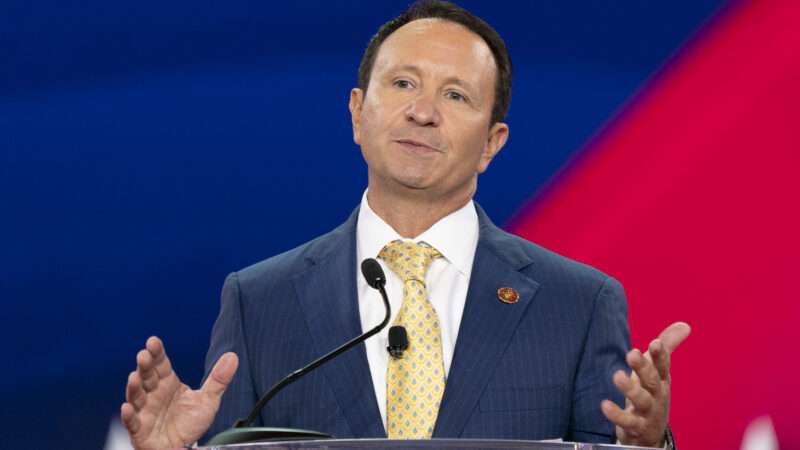
The Louisiana Legislature is advancing a package of bills that would drastically roll back criminal justice reforms in a state known until recently for having the highest incarceration rate in the country and the second-highest number of wrongful convictions.
Among the proposals moving through the Republican-controlled chambers are bills that would allow 17-year-olds to be charged as adults, unseal some juvenile criminal records, significantly reduce parole eligibility and "good time" credits inmates can earn toward early release, and limit post-conviction appeals. Other measures would expand the state's methods of performing executions to include nitrogen gas and electrocution while making the state's capital punishment process off-limits to public records requests.
The Legislature convened a special session this month at the request of newly seated Republican Louisiana Gov. Jeff Landry, who in a February 19 speech to lawmakers cited violent crime in the state's three largest cities as evidence that the criminal justice system in Louisiana had "lost balance" and forgotten about crime victims.
"Everyone in this room is aware that crime has put a national spotlight on our great state," Landry said. "In 2021, Louisiana had the highest violent crime rate in the nation. In 2022, three of our cities were in the top 10 most dangerous cities in America. Two-hundred and eighty people were murdered that year in New Orleans alone, earning that city the title of 'murder capital' of the country."
Many of the items on Landry's laundry list of priorities target reforms passed in 2017 as part of a bipartisan package called the Justice Reinvestment Initiative (JRI). Louisiana was one of many red states that passed criminal justice reforms in the 2010s as the cost of their prison systems exploded. As Reason wrote at the time, Louisiana had a staggering incarceration rate—nearly double the rest of the country—driven by lengthy sentences for nonviolent offenders and a large number of inmates serving life sentences with no possibility of parole.
Criminal justice advocacy groups across the political spectrum and some crime analysts say that available data undercuts Republicans' arguments for many of the rollbacks.
"The governor's policy proposals are not evidence based, lack the data necessary to inform sound criminal justice policy, and will disproportionately harm communities of color," the Louisiana chapter of the American Civil Liberties Union said in a press release.
Opponents of the rollback, such as the conservative criminal justice advocacy group Right on Crime, point to a report released earlier this month by the Louisiana Legislative Auditor (LLA) on the impact of the JRI.
"We urge Louisiana lawmakers to consider these findings, both the successes and areas that need improvement, as they move forward this week with the Special Session on crime," Scott Peyton, Louisiana director of Right on Crime, said in a press release. "There is nothing in the LLA report that suggests the JRI should be discontinued or dismantled. Instead, this report points to successes and areas for improvement."
According to the LLA report, since the package of criminal justice reform bills was passed in 2017, it has saved the state of Louisiana $152.7 million and largely accomplished its goal of prioritizing prison beds for violent offenders—the overall prison population decreased while the percentage of inmates incarcerated for violent offenses increased. Mississippi overtook Louisiana as the state with the highest incarceration rate. In addition, inmates released based on the JRI's changes to good time credits "do not appear to return to custody at a higher rate than the overall return rate."
However, the report did find a lack of integrated data, a lack of performance measures, and a lack of consensus on the impact of the JRI have all hampered its rollout. In addition, it noted that "while the percentage of those released from incarceration and subsequently returning is lower than the five years before JRI, those who do return are returning sooner than previous years."
In his speech, Landry also conspicuously did not cite 2023's crime numbers, which give a muddier but less apocalyptic picture.
The Louisiana Illuminator reported, "New Orleans and Baton Rouge saw significant drops in homicides last year, but Shreveport saw a significant increase. At the same time, the overall rate of violent crime in Shreveport fell in 2023."
Beyond that, crime analysts say that they don't see how many of the proposed laws will actually result in reductions in violent crime on the front end of the justice system.
Jeff Asher, co-founder of the New Orleans firm AH Datalytics, told Axios that "it feels like trying to fix the Saints' quarterback problems by drafting a center-fielder."
The post Louisiana Legislature Advances Bills To Roll Back Criminal Justice Reforms appeared first on Reason.com.







